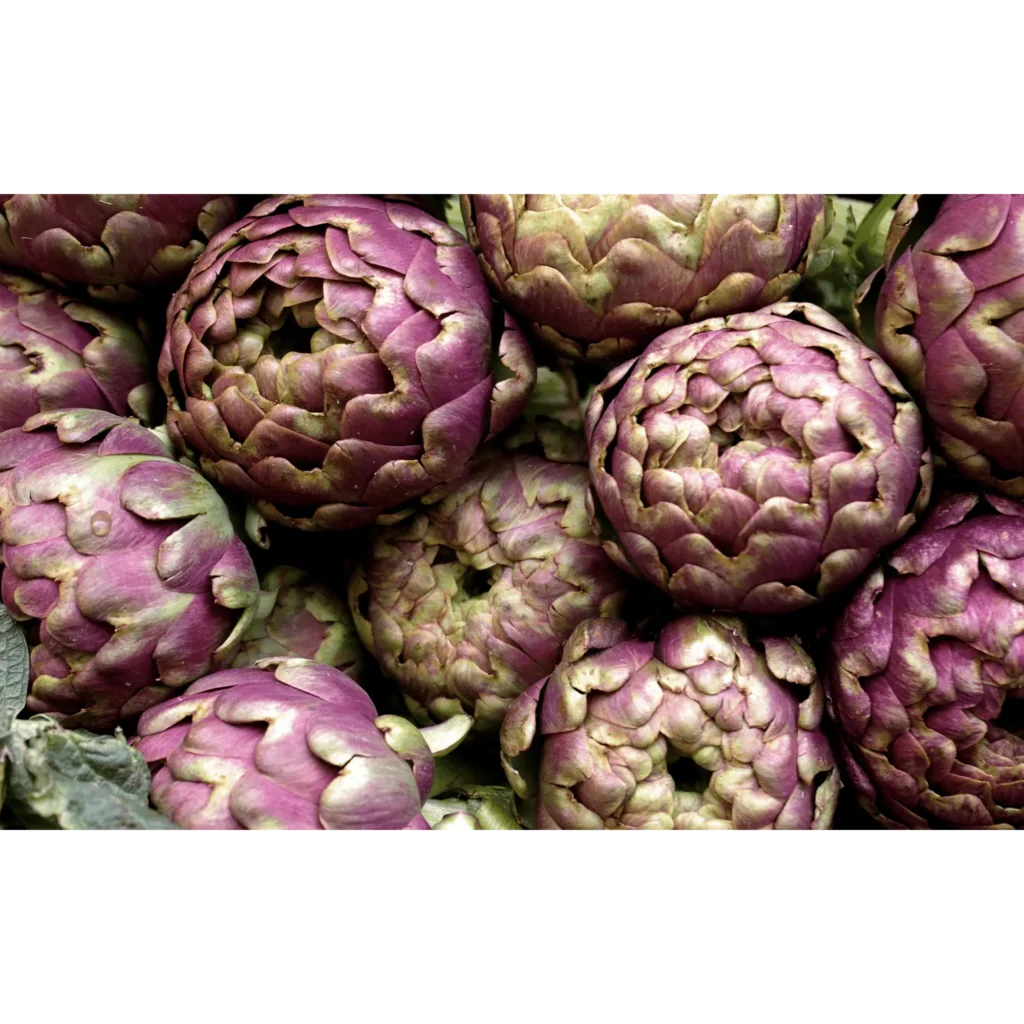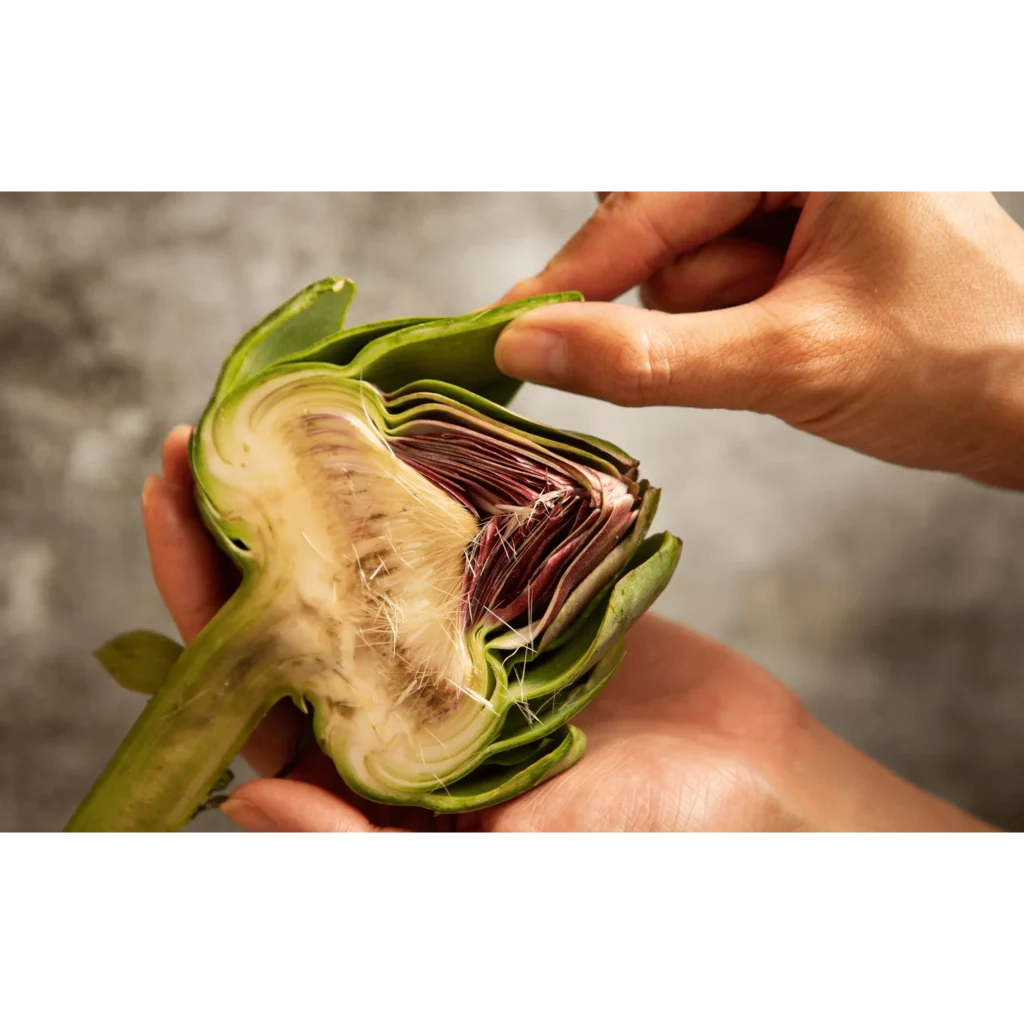With their delectable taste and impressive nutritional profile, artichokes are a culinary delight for many humans. However, when it comes to our beloved canine companions, questions arise regarding the suitability of this vegetable in their diets. As conscientious pet owners, it’s only natural to ponder whether artichokes are a safe addition to our dogs’ meals.
In this article, we will look closely at whether it’s okay for dogs to eat artichokes. We want to make sure our furry friends stay happy and healthy. We’ll check out the good stuff artichokes have and any possible problems they might cause for dogs. Let’s dig in and find out if artichokes are a good choice for our furry friends!
Below are the topics we’ll discover in this blog post:
- What are Artichokes?
- Can Dogs Eat Artichokes?
- Health Benefits of Artichokes for Dogs
- Risks of Feeding Your Dogs Artichokes
- How to Safely Feed Artichokes to Dogs?
- Before Sharing With Your Pooch
What are Artichokes?

The globe artichoke, sometimes called the French or green artichoke in the U.S., is a type of thistle that people grow to eat. You can eat the part of the plant that’s still a bud before it turns into a flower. That’s the yummy part we enjoy as food!
Artichokes have a unique flavor and are rich in nutrients such as fiber, vitamins, and minerals. They can be prepared in various ways, including steaming, boiling, grilling, or even eating raw. Artichokes are enjoyed as a culinary delicacy in many parts of the world.
Can Dogs Eat Artichokes?
Yes, dogs can eat artichokes, but there are some things to be careful about. Artichokes are full of good stuff for dogs, like the leaves, hearts, and stems. But, especially for small dogs, the tough leaves can be hard to chew and might cause them to choke. So, it’s important to cut the artichokes into small pieces before giving them to your dog.
Also, avoid giving your dog canned artichokes with oil or spices. The oil can make them gain too much weight, and spices might upset their tummy. Instead, it’s best to cook the artichokes yourself without any added stuff. Steaming them and then cutting them up into tiny pieces is a safe way to share them with your furry friend.
Remember, while artichokes can be a yummy treat for your dog, it’s important to be careful and make sure they’re served safely.
Health Benefits of Artichokes for Dogs:

Artichokes can offer several health perks for dogs when incorporated into their diet in moderation. Here are the potential advantages:
1. Nutrient-Rich:
Artichokes are nutrient-rich, offering a variety of vitamins, minerals, and other beneficial compounds that can support your dog’s health. They contain fiber, which aids in digestion and promotes bowel regularity.
Additionally, artichokes provide vitamins such as vitamin C, which supports the immune system, and vitamin K, which is important for bone health and blood clotting.
Minerals like potassium and magnesium are also present, contributing to heart health and muscle function. Overall, incorporating artichokes into your dog’s diet can provide a wholesome source of essential nutrients to help them thrive.
2. Antioxidants:
Artichokes are rich in antioxidants, which are beneficial compounds that help neutralize harmful free radicals in the body. These antioxidants include flavonoids, polyphenols, and other plant-based compounds. By scavenging free radicals, antioxidants help reduce oxidative stress and inflammation, which can contribute to various health issues in dogs.
Antioxidants in artichokes support overall cellular health, promote a strong immune system, and may even help protect against certain diseases. Including artichokes in your dog’s diet can provide them with an extra boost of antioxidants to support their well-being and longevity.
3. Fiber:
Artichokes are a good source of dietary fiber, which is beneficial for your dog’s digestive health. Fiber plays an essential role in maintaining regular bowel movements and preventing constipation. It also helps promote a healthy gut environment by supporting the growth of beneficial gut bacteria.
Dietary fiber can aid in weight management by providing a feeling of fullness, which may help prevent overeating. By including artichokes in your dog’s diet, you can provide them with a natural source of fiber to support their digestive system and overall well-being.
4. Low in Calories and Fat:
Artichokes are low in calories and fat, making them a healthy option for dogs, especially those on weight-management diets. With their satisfying crunch and delicious flavor, artichokes can be a great addition to your dog’s meals without adding excess calories or fat. This makes them a suitable treat for dogs looking to maintain a healthy weight or those with weight-related health concerns.
By incorporating artichokes into your dog’s diet, you can provide them with a nutritious and tasty snack that won’t contribute to unnecessary weight gain.
5. Heart Health:
Artichokes can contribute to heart health in dogs due to their nutrient composition. They contain potassium, a mineral that helps regulate blood pressure and support proper cardiovascular function.
You can help maintain healthy blood pressure levels and reduce the risk of heart-related issues by including artichokes in your dog’s diet. Additionally, the antioxidants found in artichokes can help protect the heart by reducing inflammation and oxidative stress. Overall, incorporating artichokes into your dog’s meals can contribute to their overall heart health and well-being.
While artichokes can provide these health benefits, it’s essential to introduce them gradually into your dog’s diet and monitor for any adverse reactions.
Risks of Feeding Your Dogs Artichokes:

While artichokes can offer some health benefits for dogs, there are also potential drawbacks associated with feeding them this vegetable:
1. Choking Hazard:
The tough fibers in artichoke leaves can pose a choking hazard, especially for smaller dogs or those who are prone to swallowing large pieces without proper chewing.
To mitigate this risk, it’s essential to cut artichokes into small, manageable pieces before feeding them to your dog.
2. Gastrointestinal Upset:
Introducing new foods like artichokes into your dog’s diet can sometimes lead to gastrointestinal upset, such as vomiting, diarrhea, or abdominal discomfort. Some dogs may have sensitivities or allergies to certain components of artichokes, resulting in digestive issues.
It’s important to monitor your dog for any adverse reactions after feeding them artichokes and consult with your veterinarian if necessary.
3. High-Fiber Content:
While fiber is beneficial for digestive health, excessive consumption of fiber-rich foods like artichokes can lead to gastrointestinal issues such as bloating, gas, or diarrhea, particularly in dogs with sensitive stomachs or digestive disorders.
It’s essential to introduce artichokes gradually into your dog’s diet and monitor their response to ensure they tolerate it well.
4. Preparation and Seasoning:
Canned artichokes often contain added oils, salt, or seasonings, which can be harmful to dogs. The high fat content in oil can contribute to weight gain and digestive upset, while excess salt can lead to dehydration and other health issues.
It’s best to avoid canned artichokes and prepare fresh or frozen artichokes without any added ingredients.
5. Potential Allergies:
While uncommon, some dogs may be allergic to artichokes or certain components found in them. Signs of an allergic reaction in dogs can include itching, redness, swelling, or gastrointestinal symptoms.
If you suspect your dog may be allergic to artichokes, discontinue feeding them and consult with your veterinarian for further guidance.
While artichokes can be included in your dog’s diet as an occasional treat or dietary supplement, it’s essential to be aware of these potential risks and take precautions to ensure your dog’s safety and well-being.
How to Safely Feed Artichokes to Dogs?
To safely feed your dog artichokes and ensure they receive healthy nutrients without risking their health, follow these simple guidelines:
1. Avoid Marinated or Seasoned Artichokes:
Avoid feeding your dog marinated artichoke hearts or artichoke-based foods like dips, which can contain high levels of fat, oil, and seasonings that may upset their stomach or even contain harmful ingredients like onions or garlic. Instead, opt for fresh or steamed artichokes without any additional ingredients.
2. Focus on Tender Parts:
Only give your dog the tender parts of the artichoke, such as the heart and the stem, while avoiding the tough leaves. Artichoke leaves can pose a choking hazard or lead to intestinal blockages if ingested in large pieces.
3. Cut into Small Pieces:
Before giving artichokes to your dog, make sure to cut all parts into small, bite-sized pieces. This minimizes the risk of choking and aids digestion for your furry friend.
4. Start with Small Portions:
Introduce artichokes to your dog’s diet gradually and in small quantities. Any new food can potentially upset your dog’s stomach, especially high-fiber foods like artichokes. Begin with a few small pieces and monitor your dog’s reaction. If they tolerate it well, you can gradually increase the portion size, but avoid overfeeding.
By following these guidelines, you can safely incorporate artichokes into your dog’s diet and provide them with nutritious benefits without endangering their health. Always monitor your dog’s response to new foods and consult with your veterinarian if you have any concerns or questions about their diet.
Before Sharing With Your Pooch:
Certain human foods, including artichokes, can have adverse effects on dogs. Consulting with your veterinarian before introducing new foods to your dog’s diet is crucial to ensuring their safety and well-being. This article serves as educational information and should not be considered a substitute for professional medical or dietary advice.
Your veterinarian can offer personalized recommendations tailored to your dog’s unique needs and health status. Always prioritize your pet’s health and seek guidance from a qualified professional when making decisions about their diet.
Conclusion:
In conclusion, while artichokes can offer some nutritional benefits for dogs, pet parents need to be mindful of the potential risks associated with feeding them this vegetable. Artichokes can pose choking hazards, gastrointestinal upset, and other health concerns if not prepared and served properly. However, pet owners can safely incorporate artichokes into their dog’s diet by following simple guidelines and precautions, such as avoiding seasoned or marinated artichokes, cutting them into small pieces, and starting with small portions.
Consulting with a veterinarian before introducing new foods, including artichokes, is always recommended to ensure they align with your dog’s dietary needs and health status. While artichokes can be a tasty and nutritious addition to your dog’s meals when served responsibly, it’s crucial to prioritize your pet’s safety and well-being above all else.
Remember, this article is intended for educational purposes only and should not replace professional veterinary advice. By working closely with your veterinarian and practicing responsible feeding practices, you can help ensure that your furry friend enjoys a happy and healthy life.
FAQs:
Is artichoke dog friendly?
Artichokes may surprise you—they’re the buds of the thistle plant, not vegetables, as commonly assumed. Surprisingly, they’re safe for both humans and dogs to eat. However, when sharing this tasty treat with your furry friend, remember to slice it into manageable, bite-sized pieces. Whether raw or cooked, dogs can enjoy any part of the artichoke, provided it’s unseasoned.
Can animals eat artichoke leaves?
Artichoke leaves can be helpful in animal feed, especially for tummy troubles. They contain bitter stuff that helps the liver work better and can ease digestion problems. These leaves also support bile production, which helps with digestion. Including artichoke leaves in animal feed can improve digestion and overall gut health.
What is the healthiest way to eat artichokes?
Steaming is preferred over boiling artichokes to retain more nutrients, but boiling for 20 to 40 minutes is still an option. Tip: Save the water for vegetable stock or cooking grains! Alternatively, you can bake or roast whole artichokes in a 400–425°F (200–220°C) oven for 60–80 minutes.
What do artichokes taste like?
The fleshy parts of the bracts, trimmed stem, and artichoke base are edible. Artichokes have a mild taste, akin to asparagus, but contain cynarin, a compound that reduces the tongue’s ability to taste sweetness.












